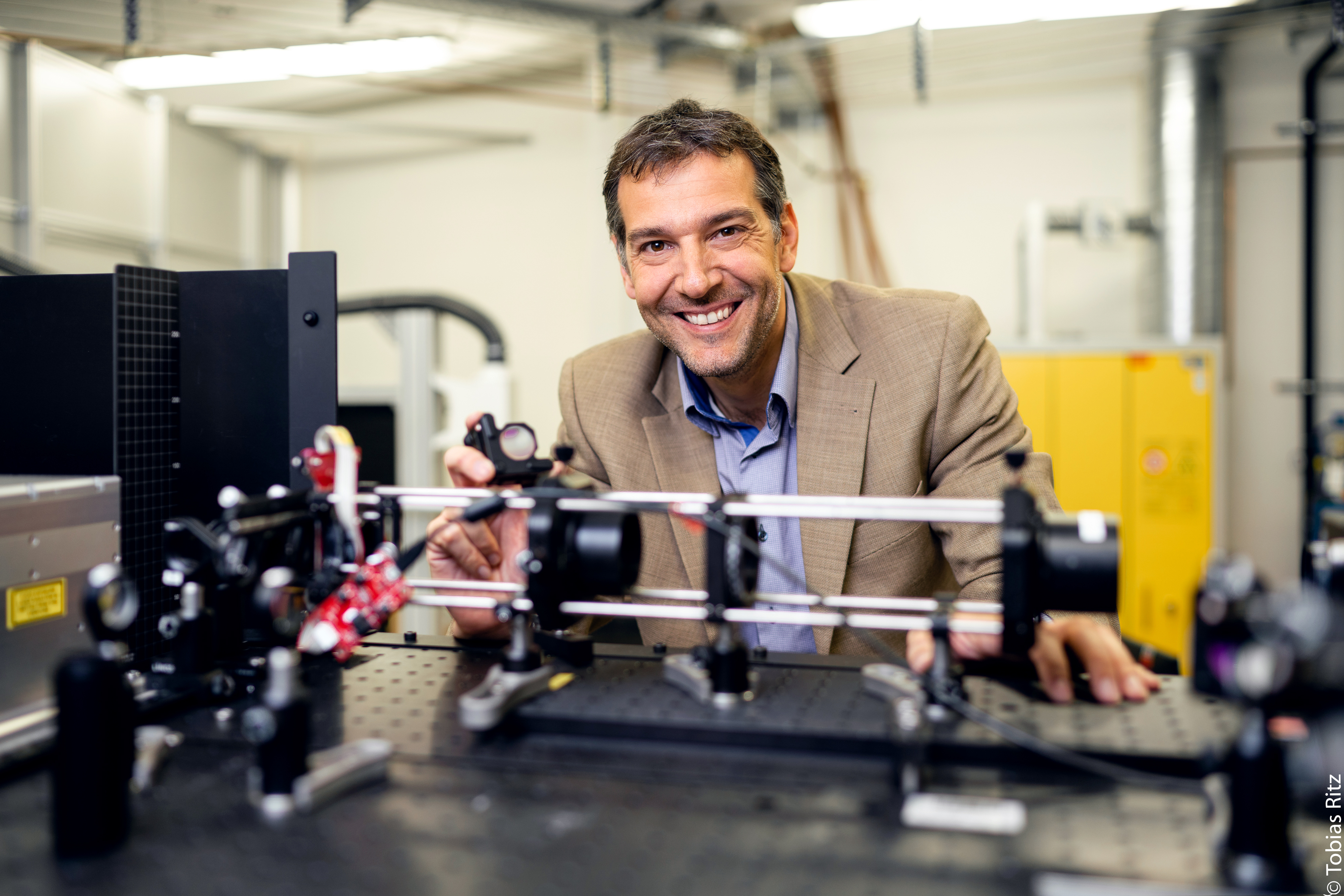Professor of the Technische Universität Dresden elected member of the Saxon Academy of Sciences
High honors for Andrés Lasagni
The Saxon Academy of Sciences in Leipzig has elected Andrés Fabián Lasagni as a full member of the Technical Science Class. With this appointment, the TU Dresden professor joins the list of more than 200 renowned members of various disciplines. During the hybrid public fall session of the Academy on December 11, 2020, Lasagni will be formally admitted to the Academy in the presence of Sebastian Gemkow, Minister of State for Science of the Free State of Saxony.

The Argentinean-born scientist has set himself ambitious goals in the spirit of the academy's mission to promote science and encourage interdisciplinary exchange: "Saxony offers a large number of small and medium-sized companies with an enormous potential for innovation. I would like to support them with new developments and findings from the basic science. The Academy will enable me to come into contact with outstanding scientists in the region, exchange ideas and realize new projects and cooperations. I am looking forward to the future!” At the same time, membership in the Central German Scholarly Society, founded in 1846 as the Royal Saxon Society of Sciences and now steeped in tradition, is a very special distinction for him: "I have been living in Saxony for twelve years now. This award is not only a recognition of my scientific work. It is a special honor for me as a foreign scientist to receive this endorsement from my colleagues".
Andrés Lasagni studied chemical engineering in Río Negro, Argentina, from 1997 to 2002 and received his doctorate in the field of materials science at Saarland University in 2006. "When I arrived in Germany at the age of 25, all I had, apart from my suitcase, was my knowledge and the motivation to achieve something," the laser expert recalls. "The first thing I had to do was to learn the language, understand the culture and work hard to develop scientifically. Thanks to the people who believed in me, all this was possible. In particular, the continuous support of my wife and her family, who are from Saxony, has always given me the necessary backing.” Today, he is professor for laser-based methods of large-area surface structuring at TU Dresden and one of the directors of the "Center for Advanced Micro-Photonics (CAMP)" at the Fraunhofer Institute for Material and Beam Technology IWS Dresden. He also holds nearly 30 patents, more than 250 scientific publications and numerous national memberships, such in the German Society for Materials Science and in international networks.
Information for journalists:
Prof. Andrés Fabián Lasagni
andres_fabian.lasagni@tu-dresden.de
andres-fabian.lasagni@iws.fraunhofer.de
Background information:
About the Saxon Academy of Sciences in Leipzig
Since its foundation as the Royal Saxon Society of Sciences and Humanities in 1846, the Saxon Academy of Sciences in Leipzig has been committed to the tradition of the Leibniz-influenced academy concept of bringing together leading scientists from a wide range of disciplines for regular discourse and to conducting long-term research in the catchment areas of Saxony, Saxony-Anhalt and Thuringia.
Currently, the Academy is engaged in more than 20 projects, many of them in close cooperation with universities, colleges and non-university research institutions – the goal of basic research in the humanities is the printed and digital indexing, securing and visualization of cultural world heritage.
In numerous series of events, experts from science and politics are invited to advance the public discourse on current social and science policy issues - a transdisciplinary dialogue that is also continued in the academy journal „Denkströme“.
The Saxon Academy of Sciences is a member of the Union of German Academies of Sciences and Humanities. The Union coordinates the academy program – one of the largest research programs in the humanities and cultural sciences in the Federal Republic of Germany. The Free State of Saxony bears the costs of the scholarly society and the office of the Saxon Academy of Sciences in Leipzig.
Information at www.saw-leipzig.de
This measure is co-financed by taxes on the basis of the budget adopted by the Saxon State Parliament.
About the TU Dresden
TU Dresden is one of the top universities in Germany and Europe: strong in research, first-class in the variety and quality of its courses, closely networked with culture, business and society. As a modern university, with its five Schools in 18 faculties, it offers a broad scientific spectrum like few other universities in Germany. It is the largest university in Saxony. The large TU Dresden campus family consists of around 32,000 students and about 8,000 employees - 600 of whom are professors. Since 2012, the TU Dresden has been one of the eleven Excellence Universities in Germany. On July 19, 2019, it successfully defended this title.
About the Center for Advanced Micro-Photonics (CAMP)
CAMP focuses on laser-based surface modification and structuring processes. The center targets oporunities and challenges in the development of new system, process and measurement solutions. To transfer Technologies into industrial processes, the researchers implement every step along the entire process chain. CAMP employs cross-operational approaches ranging from simulation, laser process and optical measurements to machine learning. The scientists of Fraunhofer IWS and TU Dresden focus on various applications of laser micromachining and measurement engineering. The center deploys a wide range of current technologies. In 2019, CAMP researchers published more than 37 papers in peer-reviewed journals and 17 further contributions in conference proceedings. 50 talks and posters presented the research work, including seven plenary and invited talks. CAMP members were awarded with various national and international prizes.
 Fraunhofer Institute for Material and Beam Technology IWS
Fraunhofer Institute for Material and Beam Technology IWS